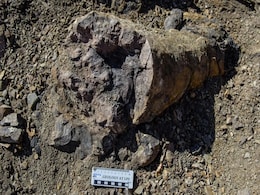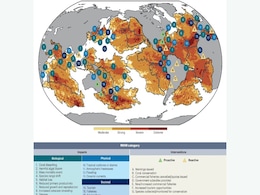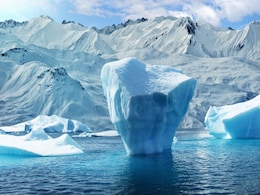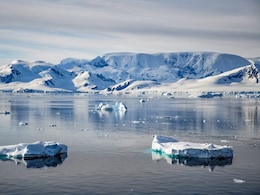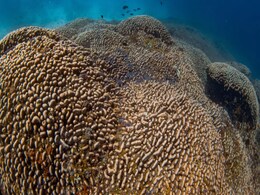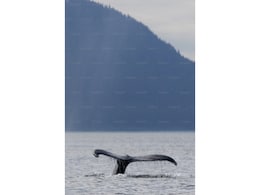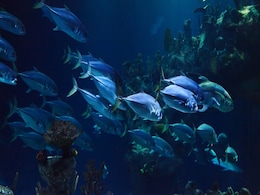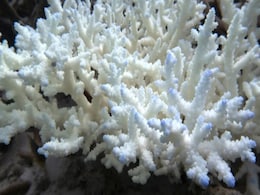Marine Ecosystems
- All
- News
- Videos
-

Antarctic Ice Melt Weakens Strongest Ocean Current, Disrupting Global Circulation
- Friday March 21, 2025
- Written by Gadgets 360 Staff
The Antarctic Circumpolar Current, the planet’s most powerful ocean circulation system, could slow by 20 percent by 2050 due to melting Antarctic ice. Researchers suggest that the influx of fresh, cold water is disrupting convection, altering global ocean density. A weaker current may allow warm water to reach Antarctica, accelerating ice loss an...
-
 www.gadgets360.com
www.gadgets360.com
-

Fossil Evidence Shows Plants Survived the End-Permian Mass Extinction in China
- Tuesday March 18, 2025
- Written by Gadgets 360 Staff
Fossils discovered in China indicate that the End-Permian mass extinction, which wiped out 80% of life on Earth, may not have been as devastating for plants as previously thought. Researchers found evidence of gymnosperm forests and ferns in rock layers from this period, suggesting that some ecosystems remained intact. This discovery challenges ass...
-
 www.gadgets360.com
www.gadgets360.com
-

World’s Largest Iceberg A23a Grounds Near South Georgia, Raising Wildlife and Environmental Concerns
- Friday March 7, 2025
- Written by Gadgets 360 Staff
The world’s largest iceberg, A23a, has run aground near South Georgia, a key wildlife haven. Scientists are monitoring its impact on marine life, particularly on penguins and seals, as it could disrupt feeding routes. Some experts suggest the iceberg may also enhance ocean productivity by releasing nutrients. If it fragments, it may pose risks to...
-
 www.gadgets360.com
www.gadgets360.com
-

Scientists Warn of Alarming Rise in Marine Heat Waves and Its Impact on Oceans
- Thursday March 6, 2025
- Written by Gadgets 360 Staff
Reports indicate a sharp rise in marine heat waves, with 2023–2024 experiencing a 240% increase compared to past years. Scientists warn of devastating effects on marine life, including mass die-offs, coral reef degradation, and increased storm intensity. Coastal communities are at risk as extreme weather events linked to warming oceans become mor...
-
 www.gadgets360.com
www.gadgets360.com
-

World's Largest Iceberg A23a Resumes Journey North After Months of Stagnation
- Tuesday December 17, 2024
- Written by Gadgets 360 Staff
A23a, the largest iceberg in the world, has begun moving again after being trapped in a vortex near the South Orkney Islands. Weighing nearly a trillion tonnes and twice the size of Greater London, the iceberg has been stuck in the Weddell Sea for over three decades. Now on its way north, scientists are studying its potential environmental impacts,...
-
 www.gadgets360.com
www.gadgets360.com
-

Antarctic 'Plastisphere': A Unique, Potentially Hazardous New Ecosystem
- Wednesday December 11, 2024
- World News | The Conversation
Antarctica, the worlds most remote, harsh and pristine continent, is not free from marine pollution. Where human activity goes, plastic debris inevitably follows.
-
 www.ndtv.com
www.ndtv.com
-

Ocean Acidification Study: Carbon Emissions Driving Deeper Chemical Changes in Oceans
- Monday December 2, 2024
- Written by Gadgets 360 Staff
A study in Science Advances by researchers from ETH Zurich highlights the escalating depth of ocean acidification, driven by carbon emissions since the industrial era. By 2014, acidification had penetrated to an average depth of 1,000 metres, with some regions affected as deep as 1,500 metres. Using a 3D model, the study explores the altered marine...
-
 www.gadgets360.com
www.gadgets360.com
-

Sea Turtles Can Aid Scientists Map Under-Ocean Seagrass in an Attempt to Conserve Marine Ecology
- Thursday November 28, 2024
- Written by Gadgets 360 Staff
A study in the Red Sea has shown that satellite-tagged green turtles can map seagrass meadows more accurately than conventional satellite imagery. By tracking 53 turtles, the researchers uncovered 34 new seagrass patches. This method not only overcomes the challenges of existing mapping technologies but also aids in conserving these vital ecosystem...
-
 www.gadgets360.com
www.gadgets360.com
-

Scientists Discover World's Largest Coral Discovered in Solomon Islands
- Saturday November 16, 2024
- Written by Gadgets 360 Staff
A giant coral reef, the largest ever recorded, has been discovered in the Solomon Islands, measuring 111 feet wide and 104 feet long. This reef is estimated to be 300-500 years old, offering a vital habitat for marine life. Scientists are concerned about the threats it faces, including overfishing and climate change, both of which could jeopardize ...
-
 www.gadgets360.com
www.gadgets360.com
-

World's Largest Ocean Predator-Prey Marine Event Captured Off Norway's Coast
- Tuesday November 5, 2024
- Written by Gadgets 360 Staff
In a first-of-its-kind discovery, MIT scientists observed a massive predator-prey event in Norway, where millions of cod pursued spawning capelin. The event highlights the critical role of capelin in the marine food chain, providing sustenance for predatory fish like Atlantic cod. However, as Arctic ice retreats due to climate change, capelin face ...
-
 www.gadgets360.com
www.gadgets360.com
-

Record-Breaking Marine Predation Event Provides Insights into Ocean Ecosystems
- Thursday October 31, 2024
- Written by Gadgets 360 Staff
In a groundbreaking observation, scientists have recorded the largest marine predation event ever documented, offering unprecedented insights into ocean ecosystem dynamics. Using advanced sonar technology, researchers tracked interactions between capelin, a small forage fish, and their primary predator, cod, as part of a massive, coordinated predat...
-
 www.gadgets360.com
www.gadgets360.com
-

How A Melting Iceberg Is Reshaping Marine Ecosystems
- Monday October 28, 2024
- World News | Edited by NDTV News Desk
A massive iceberg, A-68, which broke off from Antarctica's Larsen C Ice Shelf in 2017, has created a distinctive marine environment during its four-year drift, according to recent scientific analyses.
-
 www.ndtv.com
www.ndtv.com
-

Animal Life Discovered Underground Near Hydrothermal Vents in the Deep Pacific Seabed
- Saturday October 19, 2024
- Written by Gadgets 360 Staff
Recent deep-sea explorations have unveiled a remarkable ecosystem thriving beneath the Pacific Ocean's floor. Scientists deployed a remotely operated vehicle to investigate hydrothermal vent sites along the East Pacific Rise, where two tectonic plates diverge. Beneath the seafloor, they discovered cavities harboring giant tubeworms—the largest wo...
-
 www.gadgets360.com
www.gadgets360.com
-

Climate Change Could Make Earth's Oldest Microorganisms Dominant in Oceans, Study Reveals
- Tuesday August 20, 2024
- Gadgets 360 Staff
New research highlights a significant shift in marine ecosystems due to climate change. Prokaryotes, the oldest and smallest microorganisms on Earth, are expected to become more dominant as ocean temperatures rise. These microorganisms, which include bacteria and archaea, play a crucial role in marine nutrient cycles and food chains. However, their...
-
 www.gadgets360.com
www.gadgets360.com
-

Great Barrier Reef Faces Hottest Ocean Temperatures in 400 Years, Threatening Coral Survival
- Tuesday August 13, 2024
- NDTV
The Great Barrier Reef, one of Earth's most significant natural treasures, is currently experiencing its hottest sea surface temperatures in four centuries. According to a study published in Nature, the first quarter of 2024 recorded a temperature rise of 0.19°C above the previous peak. This extreme warming is directly linked to extensive coral bl...
-
 www.gadgets360.com
www.gadgets360.com
-

Antarctic Ice Melt Weakens Strongest Ocean Current, Disrupting Global Circulation
- Friday March 21, 2025
- Written by Gadgets 360 Staff
The Antarctic Circumpolar Current, the planet’s most powerful ocean circulation system, could slow by 20 percent by 2050 due to melting Antarctic ice. Researchers suggest that the influx of fresh, cold water is disrupting convection, altering global ocean density. A weaker current may allow warm water to reach Antarctica, accelerating ice loss an...
-
 www.gadgets360.com
www.gadgets360.com
-

Fossil Evidence Shows Plants Survived the End-Permian Mass Extinction in China
- Tuesday March 18, 2025
- Written by Gadgets 360 Staff
Fossils discovered in China indicate that the End-Permian mass extinction, which wiped out 80% of life on Earth, may not have been as devastating for plants as previously thought. Researchers found evidence of gymnosperm forests and ferns in rock layers from this period, suggesting that some ecosystems remained intact. This discovery challenges ass...
-
 www.gadgets360.com
www.gadgets360.com
-

World’s Largest Iceberg A23a Grounds Near South Georgia, Raising Wildlife and Environmental Concerns
- Friday March 7, 2025
- Written by Gadgets 360 Staff
The world’s largest iceberg, A23a, has run aground near South Georgia, a key wildlife haven. Scientists are monitoring its impact on marine life, particularly on penguins and seals, as it could disrupt feeding routes. Some experts suggest the iceberg may also enhance ocean productivity by releasing nutrients. If it fragments, it may pose risks to...
-
 www.gadgets360.com
www.gadgets360.com
-

Scientists Warn of Alarming Rise in Marine Heat Waves and Its Impact on Oceans
- Thursday March 6, 2025
- Written by Gadgets 360 Staff
Reports indicate a sharp rise in marine heat waves, with 2023–2024 experiencing a 240% increase compared to past years. Scientists warn of devastating effects on marine life, including mass die-offs, coral reef degradation, and increased storm intensity. Coastal communities are at risk as extreme weather events linked to warming oceans become mor...
-
 www.gadgets360.com
www.gadgets360.com
-

World's Largest Iceberg A23a Resumes Journey North After Months of Stagnation
- Tuesday December 17, 2024
- Written by Gadgets 360 Staff
A23a, the largest iceberg in the world, has begun moving again after being trapped in a vortex near the South Orkney Islands. Weighing nearly a trillion tonnes and twice the size of Greater London, the iceberg has been stuck in the Weddell Sea for over three decades. Now on its way north, scientists are studying its potential environmental impacts,...
-
 www.gadgets360.com
www.gadgets360.com
-

Antarctic 'Plastisphere': A Unique, Potentially Hazardous New Ecosystem
- Wednesday December 11, 2024
- World News | The Conversation
Antarctica, the worlds most remote, harsh and pristine continent, is not free from marine pollution. Where human activity goes, plastic debris inevitably follows.
-
 www.ndtv.com
www.ndtv.com
-

Ocean Acidification Study: Carbon Emissions Driving Deeper Chemical Changes in Oceans
- Monday December 2, 2024
- Written by Gadgets 360 Staff
A study in Science Advances by researchers from ETH Zurich highlights the escalating depth of ocean acidification, driven by carbon emissions since the industrial era. By 2014, acidification had penetrated to an average depth of 1,000 metres, with some regions affected as deep as 1,500 metres. Using a 3D model, the study explores the altered marine...
-
 www.gadgets360.com
www.gadgets360.com
-

Sea Turtles Can Aid Scientists Map Under-Ocean Seagrass in an Attempt to Conserve Marine Ecology
- Thursday November 28, 2024
- Written by Gadgets 360 Staff
A study in the Red Sea has shown that satellite-tagged green turtles can map seagrass meadows more accurately than conventional satellite imagery. By tracking 53 turtles, the researchers uncovered 34 new seagrass patches. This method not only overcomes the challenges of existing mapping technologies but also aids in conserving these vital ecosystem...
-
 www.gadgets360.com
www.gadgets360.com
-

Scientists Discover World's Largest Coral Discovered in Solomon Islands
- Saturday November 16, 2024
- Written by Gadgets 360 Staff
A giant coral reef, the largest ever recorded, has been discovered in the Solomon Islands, measuring 111 feet wide and 104 feet long. This reef is estimated to be 300-500 years old, offering a vital habitat for marine life. Scientists are concerned about the threats it faces, including overfishing and climate change, both of which could jeopardize ...
-
 www.gadgets360.com
www.gadgets360.com
-

World's Largest Ocean Predator-Prey Marine Event Captured Off Norway's Coast
- Tuesday November 5, 2024
- Written by Gadgets 360 Staff
In a first-of-its-kind discovery, MIT scientists observed a massive predator-prey event in Norway, where millions of cod pursued spawning capelin. The event highlights the critical role of capelin in the marine food chain, providing sustenance for predatory fish like Atlantic cod. However, as Arctic ice retreats due to climate change, capelin face ...
-
 www.gadgets360.com
www.gadgets360.com
-

Record-Breaking Marine Predation Event Provides Insights into Ocean Ecosystems
- Thursday October 31, 2024
- Written by Gadgets 360 Staff
In a groundbreaking observation, scientists have recorded the largest marine predation event ever documented, offering unprecedented insights into ocean ecosystem dynamics. Using advanced sonar technology, researchers tracked interactions between capelin, a small forage fish, and their primary predator, cod, as part of a massive, coordinated predat...
-
 www.gadgets360.com
www.gadgets360.com
-

How A Melting Iceberg Is Reshaping Marine Ecosystems
- Monday October 28, 2024
- World News | Edited by NDTV News Desk
A massive iceberg, A-68, which broke off from Antarctica's Larsen C Ice Shelf in 2017, has created a distinctive marine environment during its four-year drift, according to recent scientific analyses.
-
 www.ndtv.com
www.ndtv.com
-

Animal Life Discovered Underground Near Hydrothermal Vents in the Deep Pacific Seabed
- Saturday October 19, 2024
- Written by Gadgets 360 Staff
Recent deep-sea explorations have unveiled a remarkable ecosystem thriving beneath the Pacific Ocean's floor. Scientists deployed a remotely operated vehicle to investigate hydrothermal vent sites along the East Pacific Rise, where two tectonic plates diverge. Beneath the seafloor, they discovered cavities harboring giant tubeworms—the largest wo...
-
 www.gadgets360.com
www.gadgets360.com
-

Climate Change Could Make Earth's Oldest Microorganisms Dominant in Oceans, Study Reveals
- Tuesday August 20, 2024
- Gadgets 360 Staff
New research highlights a significant shift in marine ecosystems due to climate change. Prokaryotes, the oldest and smallest microorganisms on Earth, are expected to become more dominant as ocean temperatures rise. These microorganisms, which include bacteria and archaea, play a crucial role in marine nutrient cycles and food chains. However, their...
-
 www.gadgets360.com
www.gadgets360.com
-

Great Barrier Reef Faces Hottest Ocean Temperatures in 400 Years, Threatening Coral Survival
- Tuesday August 13, 2024
- NDTV
The Great Barrier Reef, one of Earth's most significant natural treasures, is currently experiencing its hottest sea surface temperatures in four centuries. According to a study published in Nature, the first quarter of 2024 recorded a temperature rise of 0.19°C above the previous peak. This extreme warming is directly linked to extensive coral bl...
-
 www.gadgets360.com
www.gadgets360.com


